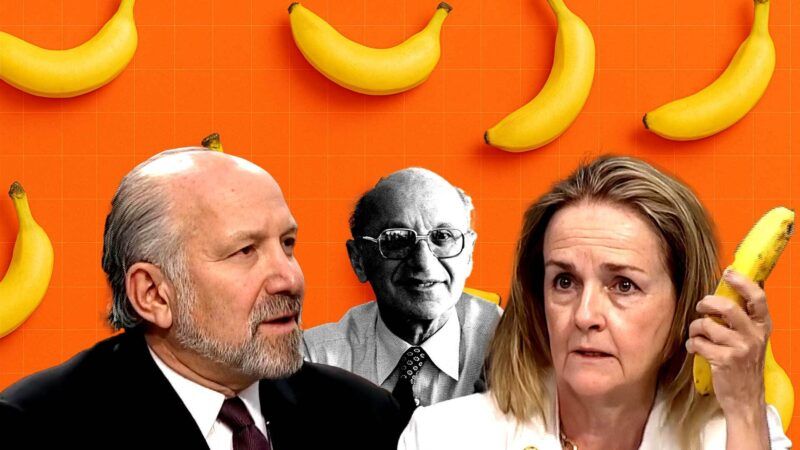Milton Friedman Disproved Trump's Argument for Tariffs Decades Ago
In a 1978 appearance at Utah State University, the Nobel Prize–winning economist provided the perfect retort to those who blindly argue we should "build in America."

Commerce Secretary Howard Lutnick appeared before the House Appropriations Committee on Thursday, fielding questions about the current presidential administration's trade strategy.
Rep. Madeleine Dean (D–Penn.) pressed Lutnick about President Donald Trump's "chaotic tariff policy." She held up a banana, imports of which are currently taxed at 10 percent. "Walmart has already increased the cost of bananas by 8 percent," she noted.
"There is no uncertainty that if you build in America, and you produce your product in America, there will be no tariff," Lutnick said. "The concept of building in America and paying no tariffs is very, very clear."
"We cannot build bananas in America," Dean retorted.
Dean is not quite right: We can grow bananas in the U.S., just not very well or very cheaply. In 2023, the U.S. imported over 5 million metric tonnes of bananas, totaling over $2 billion, while only producing about 3,500 metric tonnes.
The reason is that bananas only grow in tropical and subtropical climates: While Hawaii and Florida produce some, the majority of the world's bananas come from Southeast Asia and Latin America.
While the U.S. could increase its production of bananas, we would be fools to do so: In all but a few locations, we would have to build greenhouses to simulate the tropical climates required. Even then, the trees would take longer to produce than they would in the tropics, and it could take years or even decades to reach the level of production necessary to replace the current system, in which more than one out of every five bananas imported comes to the U.S.
Why go through all that trouble when bananas are currently available year-round at the grocery store and cost around 60 cents per pound—less than the average price of a single egg?
Lutnick seemed to acknowledge as much earlier this year, telling CNBC that 10 percent tariffs would fall more heavily on "a product that we don't make here, like a mango."
In a meeting with business leaders, Lutnick "said there would be some exemptions on imports of products like mangoes that couldn't be domestically produced at the level needed to meet U.S. demand," The Wall Street Journal reported in April. "When Trump rolled out the tariff plan on Wednesday, there were no exemptions for mango imports."
Unfortunately, the banana argument reflects the same level of logic Lutnick and Trump apply to the entirety of global trade: Any product an American purchases that was manufactured somewhere else inherently represents some loss of American wealth or sovereignty.
Just a day before his interaction with Dean, Lutnick appeared before the Senate, where he told Sen. John Kennedy (R–La.) that even if Vietnam offered to lower its tariff rate to zero, if the U.S. did the same, "that would be the silliest thing we could do."
"There are certain products we want to reshore," Lutnick explained. "We don't want other people making them."
But if other countries can make the exact same products for less, why wouldn't we let them? Making those products domestically may shore up those specific industries, but consumers would bear the brunt of it through higher prices.
Incidentally, Nobel Prize–winning economist Milton Friedman explained the lack of logic behind Lutnick's argument nearly five decades ago.
"You could have a great employment in the city of Logan, Utah, of people growing bananas in hothouses," Friedman said in 1978 during a lecture at Utah State University. "If we had a high enough tariff on the import of bananas, it could become profitable to build hothouses and grow bananas in those hothouses. That would give employment. Would that be a sensible thing to do?"
Friedman was using the banana example as the "absurd" and "extreme" end of the argument for steel tariffs, which were in the news at the time and an audience member had asked about. "If that isn't sensible," Friedman argued, "then neither is it sensible to artificially restrict the import of steel." Trump doubled the tariffs on steel this week.


Show Comments (69)